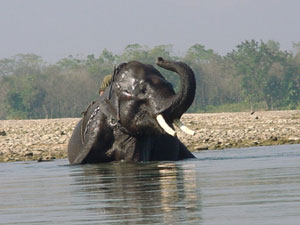![]()
| Nepal | Sauraha | 2001.12.18 - 12.20 |
Royal Chitwan National Park
The 100km wide Royal Chitwan National Park was founded in 1973 to protect the indigenous animal population. Today an estimated 544 rhinos, 80 tigers, 50 species of other mammals, and over 450 types of birds inhabit Chitwan. The park is easily reached from Kathmandu (5 hours), Pokhara (5 hours), and Sonauli (6 hours) by local or tourist bus. Accommodation options in Sauraha at the park boundary and within the park are plentiful. Within the park, expect to pay US$50~$300 per night. This charge covers the 500 NPR ($6.65) per person per day park entry fee. In Sauraha just outside the park, room prices range from US$2~$30 per night. Since wildlife is free to wander across park boundaries, the chance of seeing a rhino is the same whether staying at a $2 or $300 per night hotel.
Most tourists come to Chitwan on a 2 night / 3 day package purchased in Kathmandu or Pokhara. Prices normally start at US$60 per person per day. The cheap package includes roundtrip tourist bus transportation, 2 nights accommodation at a $2 per night place, 5 meals, a Tharu Village walk, an elephant ride, a canoe ride, and a guided jungle walk. More expensive packages follow a similar program with better accommodation or higher sales commission. Beware that 2 of the 3 day in the 2 night / 3 day package are on a bus to and from Chitwan. This leaves one full day in the park.
We recommend avoiding the packages, riding the bus to a point close to Sauraha, and paying for services separately. This method is slightly cheaper, gives the chance to view and compare multiple accommodation options (of which there are at least 100), keeps the schedule flexible in case of poor weather, and allows a wider selection of food.
We visited Chitwan en route from Sonauli to Kathmandu. All buses traveling this route in either direction stop in Narayanghat (5 hours, 150 NPR bus fare from Sonauli), a city 30km from Sauraha. From Narayanghat, regular minibuses go to Tadi Bazar (30 minutes, 5 NPR), a town 6km north of Sauraha. At the minibus stop in Tadi Bazar, touts and hotel staff scramble for tourists as they show hotel brochures, business cards, and offer free rides to certain hotels. Transportation to Sauraha is simple.
In Tadi Bazar, we randomly chose a ride to Sauraha. It happened to be the jeep owned by the Eden Jungle Resort. We agreed to look at a room but insisted that we would view 2 or 3 hotels before deciding. The Eden Jungle Resort rooms were excellent. They lowered the double room price from 500 NPR to 300 NPR and offered to waive the 30 NPR transport fee from Tadi Bazar if we stayed. The offer was too good to resist.
The next day was devoted to wildlife viewing. Our morning session was aboard the Eden Jungle Resort's elephant for a 3-hour ride through the jungle. We saw two rhinos. As we approached, our elephant shuttered and growled, maybe as a warning or maybe out of fear. The elephant trainer, who steered the elephant while sitting on its head, said we were lucky. "Some tourists stay in the jungle all day and never see a rhino."
Our afternoon session began in a dugout canoe. Floating down river along the park boundary, we passed villagers, birds, and 2 types of crocodiles. One hour 15 minutes later, we disembarked in the park for a 3½ hour walk back to Sauraha. The trail was well maintained from regular trampling but still held dangers. The initial part of the walk passed 5 crocodiles basking in the sun on the opposite bank of a stream. An hour upstream, our guide spotted a grunting rhino partially submerged. Using hand signals to direct each other, we approached into viewing range quietly. The rhino continued to grunt as it repeatedly twisted its upright ears forward and back. After 10 minutes of quietly watching the rhino, we continued along the trail. At a fork, our guide asked, "Do you want to walk along the stream near the rhino or take this safer trail around?" "How dangerous is the rhino trail?" Wes asked. "Very dangerous," he confirmed. We went around the long way.
Crossing into another section of the jungle, a shriek sounded. Repeating 4 or 5 time, the shriek sounded like a large bird. "That's a scared deer," our guide corrected. "Something is making it scared for its life." Scanning through the trees, our guide detected no movement but smelled the musk of tiger. Masami smelled it too. Our search continued for another 30 minutes but no tiger could be found. We reluctantly exited the park just before 17:00 closure and returned to our hotel.
Happy with our experience and particularly impressed with the Eden Garden Resort staff (elephant trainer, jungle guide, restaurant attendant, etc.), we thought they could benefit by having a web page. We proposed the idea to the resort owner in Kathmandu. He was interested to learn more. Agreeing to meet in Kathmandu, we boarded a bus the next morning for the 5-hour ride to the capital.
 |
While sitting atop an elephant, we see rhinos in the jungle near Sauraha. As the elephant trainer directed the elephant toward a rhino, the elephant shuttered, maybe as a warning or out of fear. |
 |
Paralleling the jungle-walk trail, crocodiles bask in the sun along the bank of a stream. |
 |
Elephant caretakers bathe their elephants after a hard day of work carrying tourists. The elephants seemed to thoroughly enjoy their scrub. |
Copyright © 2000-2002 Wes and Masami Heiser. All rights reserved.